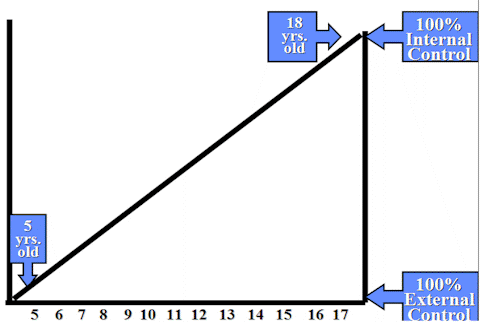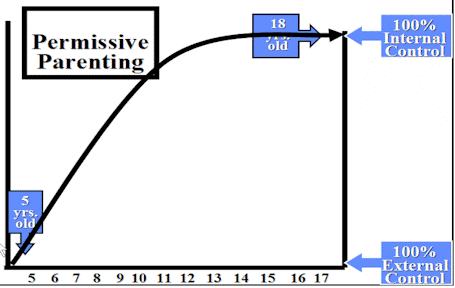Organic Discipleship - Helping People With Parenting

How couples handle their children is an important question, but even in the church, this area is often considered private and personal. Couples are often relatively closed to input in this area. Parents tend to feel they know what they are doing with their kids, even though the evidence often suggests otherwise. Our first suggestion in this area is: proceed with caution. Parents don't want to be told that they are doing things wrong. We have found that parents will accept input if we stay positive and make our suggestions as ways to further enhance parenting, rather than as criticisms.
Certainly if you are a family person yourself, and you work with family people, you will be discussing parenting plenty. If you feel you have noticed a problem in your disciple's parenting style, why not read one or two quality books on the subject that you know will make the points you feel you should make. This way, it comes from someone else, and you can just affirm what you see.
Areas to Watch
Some parents fail to invest relationally in their kids. They don't spend time with their kids in a relational setting. We should urge parents to spend time going out with their kids, building the kind of relationship that will yield huge benefits in future years. Children are really the premier disciples given by God to parents. They should view them that way, and set up special times where they invest into their kids just like they would an adult disciple. They will never regret the time they spend going out with their kids. And when the kids reach the teen years they will be glad they built a close relationship, because that relationship is the only thing that will keep their kids out of serious trouble.
Today, evangelical Christians are losing their kids as followers of Christ in huge numbers. George Barna has demonstrated that relativism and New Age spirituality have taken over a large percentage of youth today from Christian families. But surprisingly, teenage rebellion is virtually unknown in traditional cultures. In a typical African or Asian village the kids grow up without ever questioning their parents' beliefs and values. Only in the industrial west do we see the phenomenon where kids become alienated from their parents and their parents' worldview when they hit their teen years. Why is this? We would suggest that in the first place, western parents are too busy to build good relationships with their kids. Also, western culture is changing at such a rapid rate that kids find themselves a part of a culture very different from that of their parents. Too often, parents are unable to accept these differences in culture, and try to fight against their kids' cultural tastes. This is especially true with Christian parents, who often view new cultural tastes as too “worldly” to allow. They try to disallow the music, dress, cinema, and language preferred by their kids' friends in high school. The result is teenage rebellion.
This brings us to the question of the difference between permissive and controlling parenting styles. Studies show that children of permissive parents grow up deficient in many of the basic traits needed to be successful in life. They tend to lack self-control, have difficulty in long-term relationships, have a low threshold of frustration tolerance, higher delinquency rates, lower academic scores, and higher rates of drug and alcohol dependency. God placed parents in the family to lead and bring a level of discipline into the lives of their children. Permissive parenting is a disaster for kids.
But the picture isn't that simple. Consider the diagram below:

As children progress in age (the bottom axis) our goal is to see them moving away from external control to internal control. When a kid operates under external control, their parents make their decisions for them, and compel them to follow those decisions. Virtually every decision in life is made by the parents when a kid is five years old, and rightly so. Parents tell the kid what he can eat, when to go to bed, what to wear, and what shows he can watch. But we know that by the time the child reaches eighteen years of age, he will make all his own decisions, and parents can do almost nothing to prevent this. We hope by then our kids will have internal control. They won't need parents or others making decisions for them, because they have the moral sense and wisdom to make their own decisions maturely and in God's way.
Here is the catch. Kids don't go from 100% parental control to 100% internal control on the day they turn eighteen. Wise parents realize they need to see clear evidence of good internal control well before they leave the house. This is the only way we can know they have been equipped to live healthy adult lives. That means that the transition from high parental control to low parental control needs to start some years before they reach eighteen. But many parents, especially Christian parents, try to keep parental control high way too long. These parents could be described as over-controlling parents.

With high control parenting, even at fifteen, sixteen, and seventeen years of age, the child's parents are dictating many decisions. The result of such restraint is often teenage rebellion. The child senses he is old enough to be making these decisions for himself, but his parents won't let him. The resulting tension pits the child against his parents as he strives for freedom, and they strive to control him. This is a dangerous situation, because one casualty of teenage rebellion is the loss of relationship between parents and their kids. Rebelling teens won't share anything with their parents, and often describe their parents in contemptuous terms.
We already argued that permissive parenting is not the answer.

When parents are permissive, even twelve and thirteen year old kids make most of their own decisions. The lack of boundaries at this age harm the child's development. Too often, permissive parenting is a symptom of single-parent families, where the parent is too preoccupied or too tired to give sufficient guidance to children. But even intact families sometimes move to this style in a mistaken reaction to the high control they experienced in their own families. Others simply have bought into humanistic theories that kids know what is best for themselves. Some permissive parents are even reluctant to control anti-social behavior in their toddlers because they believe all controlling behavior is harmful. Research proves this is very misguided thinking.1
Consider an equipping style of parenting:

In the equipping style, the parent's goal is to foster internal control in their kids. They openly discuss this project with their kids and negotiate agreements where freedom is traded for proof that the kids can handle it. The object is to reach a point where the kids demonstrate good internal control (strong Christian values, ability to resist peer pressure, and do their work) well before they ever leave the house. Only when we see our kids demonstrating internal control in our presence can we assume they will have it away from our presence. This means the process has to begin early in the teen years. By the time kids are seventeen, they will hopefully be making most of their own decisions (still with accountability to their parents).
Another problem we see often even in Christian families has to do with the values being communicated to children. When parents go crazy at sports games, and carefully reward and punish performance at school grades, but hardly notice a child's spiritual accomplishments (or lack thereof), what are we saying? Aren't such parents really extolling the values of the world but not of Christ? Especially as kids move out of early childhood and begin to make their own spiritual decisions, parents should be alert for any developments. Ask your disciple how her kids are doing spiritually, and see how coherent and definite the answers are. Another question would be: "Are there any spiritual areas you worry about with your kid?" Or, "How do you reward and encourage spiritual development in your kids?"
If you share insight with your disciples in a way that helps them win their kids over to a life centered on God and His values, you will have helped both your disciple and the kids in a profound way. In our ministry environment, we work with families some of whom have now been in our church for twenty and thirty years. Their kids are now in high school and college in large numbers, and we see the fruit borne by different patterns of parenting. Some couples have raised kids who love their parents and the Lord in a wonderful way. Others have suffered the tragedy of losing their kids to the world. While even the best parenting can never guarantee kids will follow the Lord, equipping parenting makes it far more likely.
1 Briggs reports on research findings: “Over permissiveness was not the cure-all it was supposed to be, in fact, the results were disastrous. These children were more disturbed than those reared under authoritarianism…. [they] were self-centered and demanding. They failed to consider the rights of others. Their social relationships ran afoul, and they had trouble adjusting to the limits of classrooms and society in general. They expected others to cater to their whims just as their parents had, and they were invariably disappointed. Dorothy Corkille Briggs, Your Child's Self-esteem, (NY: Doubleday, 1970) 239. Heatherington confirms, “permissiveness is associated with lack of self control.” Mavis Heatherington, "Family Interaction and the Social, Emotional and Cognitive Development of Children Following Divorce." Paper presented at the Symposium on the Family: Setting Priorities. Sponsored by the Institute for Pediatric Service of the Johnson & Johnson Baby Co. Washington, D.C. 1978.